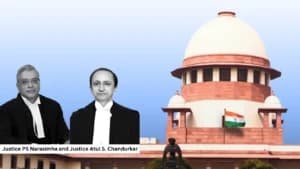The Supreme Court has ruled that a democratic society cannot be so fragile that poetry, satire, or comedy is seen as a source of public discord. The Court reaffirmed that constitutional protection for free speech does not depend on public approval and that the criminal justice system cannot be used to stifle artistic expression and dissenting voices.
This decision came in response to a case involving Congress Rajya Sabha MP Imran Pratapgadhi, who was booked by the Gujarat Police for sharing a poetry recital video on social media. The Court dismissed the First Information Report (FIR), calling it an unwarranted misuse of criminal law.
While delivering the judgment, a bench comprising Justice Abhay S. Oka and Justice Ujjal Bhuyan strongly criticized the Gujarat Police for registering an FIR against the MP under various sections of the Bharatiya Nyaya Sanhita, 2023.
Read Also:- Supreme Court Quashes FIR Against Congress MP Over Poem, Upholds Freedom of Speech
The Court remarked:
"75 years into our republic, we cannot be seen to be so shaky on our fundamentals that mere recital of a poem or, for that matter, any form of art or entertainment, such as stand-up comedy, can be alleged to lead to animosity or hatred among different communities. Subscribing to such a view would stifle all legitimate expressions of view in the public domain, which is so fundamental to a free society."
The judgment pointed out that, even after seven decades of independence, law enforcement agencies continue to violate fundamental rights, either out of ignorance or willful disregard for Article 19(1)(a) of the Constitution, which guarantees free speech.
The poem in question, "Ae Khoon Ke Pyase," was shared by Imran Pratapgadhi in a video recital posted on social media. The Gujarat Police accused the poem of creating disharmony, outraging religious feelings, and threatening national integration.
Based on these claims, authorities invoked several criminal charges under Sections 196, 197(1), 302, 299, 57, and 3(5) of the Bharatiya Nyaya Sanhita, 2023.
Read Also:- Supreme Court Dismisses Plea for FIR Against Justice Yashwant Varma, Cites Pending In-House Inquiry
After examining the content of the poem, the Supreme Court found that the allegations lacked merit. The judges ruled that the poem had no reference to any specific religion or community and instead conveyed a message of love and peaceful resistance.
"A plain reading of the poem shows that it has nothing to do with any religion, caste, or community. Nor does it promote hatred or disharmony. It only questions injustice by those in power."
The Court clarified that the term "throne" in the poem symbolically referred to oppressive rulers rather than any religious or communal entity. It emphasized that interpreting the poem as a call for violence or hatred was entirely unfounded.
The Supreme Court meticulously analyzed each legal provision cited in the FIR and determined that none of the charges were applicable.
- Section 196 (1) (a) & (b) – The Court found that the poem neither disturbed public tranquility nor promoted enmity.
- Section 197 – There was no evidence that the poem harmed national integration.
- Sections 299/302 – The allegation of deliberate insult to religious sentiments was deemed baseless.
"To say the least, it is ridiculous to claim that the appellant's act was intended to outrage religious feelings. The poem simply expresses resistance against injustice."
The Court noted that the FIR was a clear misuse of legal provisions and warned against the tendency to criminalize dissent.
Read Also:- Centre Approves Transfer of Justice CD Singh Back to Allahabad High Court
During the ruling, the Supreme Court referred to a significant observation made by Justice DY Chandrachud during his tenure at the Bombay High Court. His statement emphasized the importance of artistic and literary freedom in a democracy.
"The right of the playwright, artist, writer, and poet will be reduced to a husk if their freedom to portray a message—whether through canvas, prose, or verse—is subject to popular perception. Popular opinions cannot override constitutional values such as the freedom of expression."
Case no. – Crl.A. No. 1545/2025
Case Title – Imran Pratapgadhi v. State of Gujarat














